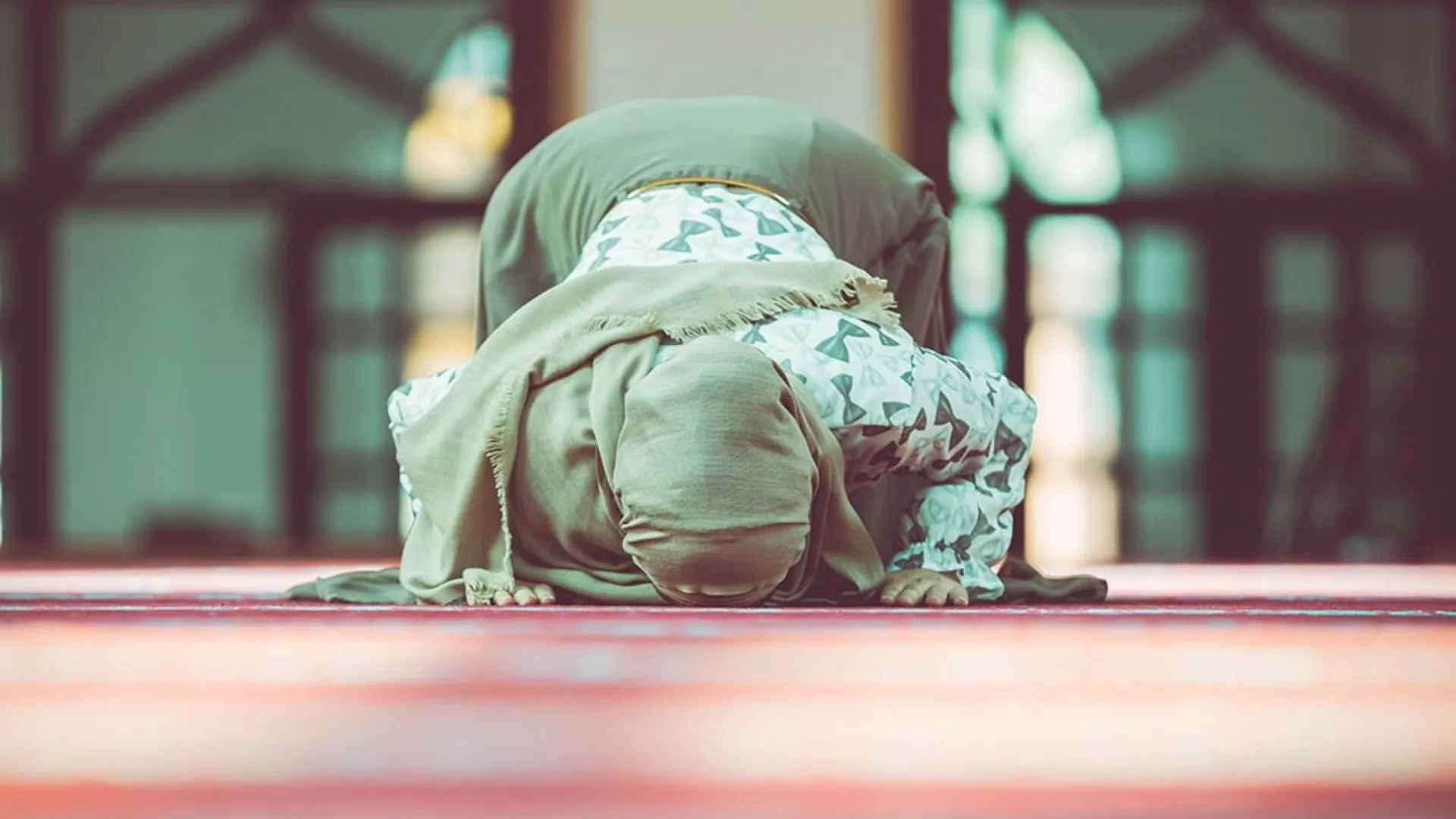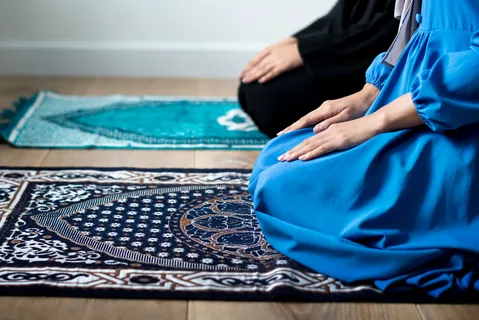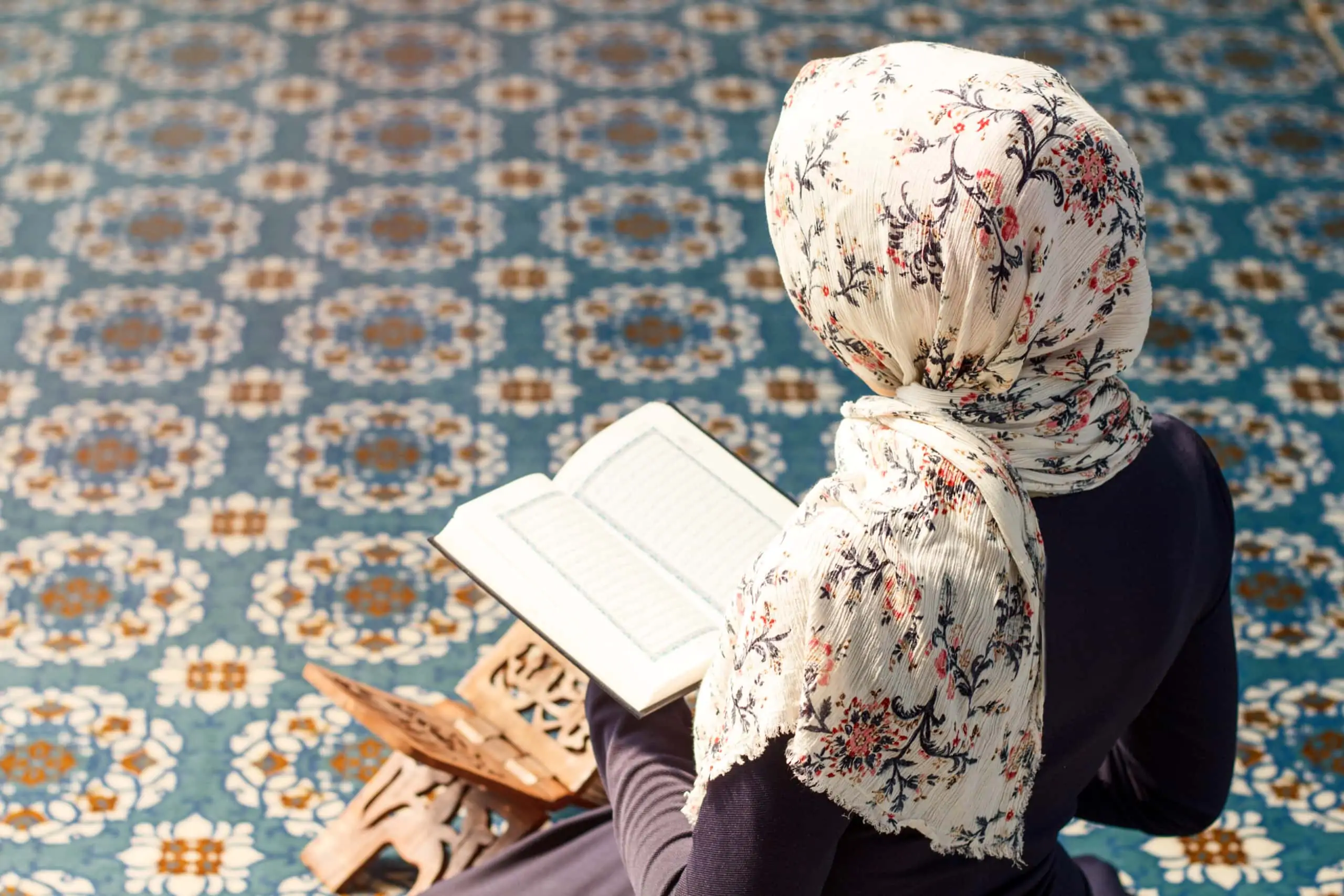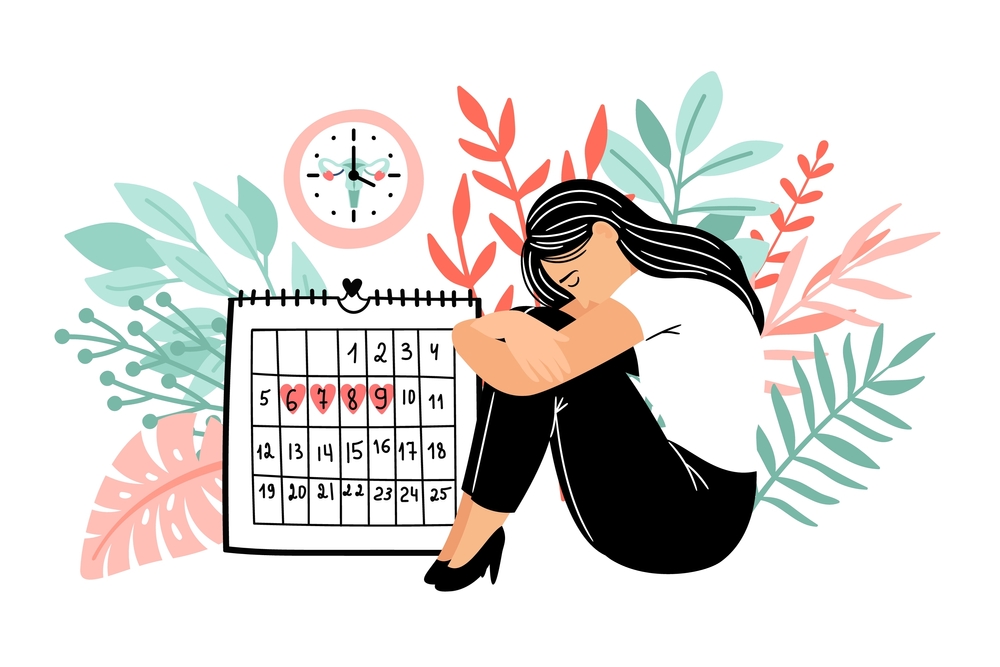Many girls and women experience premenstrual bleeding, known as spotting or Istihadah, which often causes concern and anxiety, especially when it comes to religious practices like prayer and fasting, This raises numerous questions about “can you pray if you are spotting before your period?” We will clarify this in detail in the following paragraphs.
Can you pray if you are spotting before your period?

“Can you pray if you are spotting before your period?” This question is frequently asked among Muslim women experiencing Istihadah, known as irregular bleeding before their regular menstrual cycle begins, This intermittent and irregular bleeding causes concern for many girls regarding prayer obligations, It is essential to differentiate between Istihadah and menstruation to ensure complete ritual purity for performing prayers and other religious duties.
Narrated by Aisha (may Allah be pleased with her), Fatimah bint Abi Hubaysh asked the Prophet Muhammad (peace be upon him): “O Messenger of Allah, I do not become pure from bleeding, so should I abandon prayer?” The Prophet replied: “No, it is only from a blood vessel and not menstruation, So when the actual menstruation begins, abandon prayer. When it ends, wash off the blood and pray.”
عن عائشة رضي الله عنها:
قالت فاطمة بنت أبي حبيش لرسول الله صلى الله عليه وسلم: “يا رسول الله، إني لا أطهر (من النزيف)، فهل أدع الصلاة؟” فقال رسول الله صلى الله عليه وسلم: “لا، إنما ذلك عرق وليس بالحيضة، فإذا أقبلت الحيضة فدعي الصلاة، وإذا أدبرت فاغسلي عنك الدم وصلي.”
This hadith clearly illustrates that Istihadah does not equate to menstruation and does not prevent women from performing their prayers, Women in this condition must perform ablution for each prayer and maintain cleanliness using appropriate hygiene measures, When the actual menstruation begins, they should abstain from prayer until it ends, then perform ritual bathing (ghusl) and resume prayer.
Read about: Why cant Muslim woman pray on their period
BOOK FREE SESSION
Why can’t Muslim women pray on their period?
This practice, while sometimes misunderstood, has deep-rooted theological, spiritual, and practical reasons within Islamic jurisprudence:
-
Theological Reasons:
Menstruation is seen as a state of ritual impurity (hadath), and Islamic law mandates that those in a state of impurity should refrain from certain acts of worship.
This principle is derived from the Quran and Hadith (sayings of the Prophet Muhammad) this important reason Why can’t Muslim women pray on their period.
-
Spiritual Reasons:
The period of menstruation is viewed as a time for women to rest and recuperate.
It is believed that excusing women from prayers during this time acknowledges their physical condition and provides them with a break from their regular religious obligations this important reason Why can’t Muslim women pray on their period
-
Practical Reasons:
The physical discomfort and health considerations associated with menstruation make it a practical necessity for women to abstain from certain activities, including prayers.
This period is a time for rest and self-care this important reason Why can’t Muslim woman pray on their period?.
-
Hygiene Considerations:
Historically, maintaining the necessary level of cleanliness for prayer could be challenging during menstruation. Thus, the exemption also serves to maintain the sanctity and cleanliness required for the performance of Salah this important reason Why can’t Muslim women pray on their period
-
Psychological Well-being:
This rule allows women to focus on their mental and physical well-being without the added pressure of maintaining their regular prayer routines, thus promoting overall health.
These some of answers and reasons why can’t muslim woman pray on their period or menstruation period this important reason Why can’t Muslim woman pray on their period?.
قال الله تعالى:
“وَلَا تَقْرَبُوهُنَّ حَتَّىٰ يَطْهُرْنَ ۖ فَإِذَا تَطَهَّرْنَ فَأْتُوهُنَّ مِنْ حَيْثُ أَمَرَكُمُ اللَّهُ”
(سورة البقرة، الآية 222)
وقال النبي صلى الله عليه وسلم:
“هذا شيء كتبه الله على بنات آدم.”
(صحيح البخاري)
Allah the Almighty says:
“And do not approach them until they are pure. And when they have purified themselves, then come to them from where Allah has ordained for you.”
(Surah Al-Baqarah, Ayah 222)
The Prophet (peace and blessings be upon him) said:
“This is something that Allah has ordained for the daughters of Adam.”
(Sahih Bukhari)
BOOK FREE SESSION
Can You Pray If Your Period Is more than 15 Days?

The correct view is that there is no minimum or maximum limit for the menstrual period, but generally, it tends to be six or seven days and This is the most common so It can extend up to fifteen days, and the majority of scholars agree that it should not exceed fifteen days, If it does exceed this duration, it is considered istihaadah (irregular bleeding), During this time, a woman should continue to pray, fast, and is permissible for her husband, However, if it is fifteen days or less, it is considered a regular menstrual period, and she should continue her usual practices, If it becomes shorter, she purifies herself and resumes her regular activities after that.
In any case, the menstrual period can increase or decrease; it can be six or seven days, sometimes increasing by a day or decreasing by a day, a believing woman should refrain from praying and fasting during the days she sees blood, regardless of whether the period increases or decreases, She does not pray, fast, or become permissible for her husband until she becomes pure and performs ghusl (ritual purification).
However, if the bleeding continues for up to fifteen days, this is the limit according to the correct view, If it exceeds fifteen days, it is considered istihaadah, and she should pray, fast, and become permissible for her husband, reverting to her known previous regular cycle before this increase and continuing with it, Whether it was six, seven, eight, or ten days, when it exceeds half a month, it is evident that it is istihaadah and not the regular menstrual period, The legal menstrual period does not exceed half a month. Its maximum duration is half a month. Yes.
A topic you might find engaging: Do Muslim Women Pray?
After How many days of period can you pray in Islam?
In Islam, menstruation is a natural period during which women are exempt from specific religious duties, like prayer and fasting, During this time, women are not required to perform their daily prayers or fast during Ramadan, After the bleeding stops and the woman completes the required purification process, she can resume her prayers.
Understanding the specific duration of the menstruation period and the purification process is essential, “After how many days of period can you pray in Islam?” is a common question asked by many Muslim girls and women aiming to meet their religious duties correctly, Islamic teachings offer clear instructions on this topic, ensuring women know their responsibilities and can practice their faith without confusion.
The purification process, called ghusl, is crucial for a woman to restore her state of ritual cleanliness and This involves a full-body wash that symbolizes both spiritual and physical purity, Once this ritual is completed, a woman is considered pure and can resume her religious practices, including prayer, Addressing the question, “After how many days of period can you pray in Islam?” helps spread accurate knowledge and support women in their spiritual path.
BOOK FREE SESSION
Can I fast if i am spotting before period?

When bleeding is intermittent, there is no need to wait for 72 hours (three days and nights) before fasting or praying. Instead, assess the situation for each prayer time so If there is no bleeding or spotting during a specific prayer time, you should perform that prayer, You may delay the prayer until the end of its preferred time.
Similarly, if the bleeding stops at night and there is no blood at Fajr, you must fast, Due to the uncertainty of the bleeding returning, it is important to be cautious with obligatory acts of worship such as fasting and praying.
Can you pray if you are spotting before your period? If bleeding or spotting occurs again after you have fasted or prayed, it will retrospectively be considered menstruation (hayd). However, you will not be at fault, as you made your decision based on your condition at that moment. The fasts will be invalidated, and you must make them up (qada) after Ramadan.
Can you pray if you are spotting before your period? Note that if the bleeding stops before 72 hours and does not return for at least 15 days, it is considered irregular bleeding (istihada). However, if the bleeding lasts for at least 72 hours or returns within 15 days, it is regarded as hayd. If the total bleeding exceeds 240 hours (10 days and nights), you must refer to your bleeding record to determine which days are hayd and which are periods of purity.
And Allah knows best.
A subject that may captivate your attention: Can I listen to prayer while praying?
How to Pray After Your Period in Islam?
In Islam, after a woman finishes her menstrual period, she must perform a ritual purification called ghusl before she can resume her prayers, , The process begins with making the intention (niyyah) for purification, She then washes her hands and private parts, performs a complete ablution (wudu) like for prayer, and ensures water reaches all parts of her body, including hair and skin.
Once the ghusl is completed, she is considered pure and can resume her daily prayers and other religious activities, Understanding how to pray after your period in Islam is important for maintaining spiritual and physical cleanliness, allowing women to fully participate in their religious duties, “After how many days of period can you pray in Islam?” is a common question that helps in disseminating accurate knowledge and supporting women in their spiritual journey.
BOOK FREE SESSION
Can a woman enter a mosque during periods?

he Holy Prophet’s teachings provide explicit guidance on the participation of menstruating women in mosque activities.
As you mentioned, the Prophet would permit his menstruating wives to perform tasks such as laying out mats in the mosque. However, he strictly forbade them from sitting in the mosque during their menstrual period, as evident in ahadith.
During Eid celebrations, the Prophet would encourage unmarried girls, young women observing purdah, and menstruating women to attend the Eid prayers.
He even instructed women without scarves to borrow from their sisters. However, he advised menstruating women to participate in the supplications outside the prayer room.
Similarly, during the Farewell Pilgrimage, Hazrat Aisha was menstruating and therefore not allowed to perform Umrah, which requires spending considerable time in the mosque.
After her menstruation ended, the Prophet sent her to perform Umrah separately.
In light of these clear guidelines, there is no justification for us to create new ways to fulfill our desires.
It is true that women in the past did not have access to modern hygiene products. However, this does not mean they were unable to maintain their hygiene.
Women have always found ways to adapt to their circumstances and take care of themselves.
Even with modern products, there are still limitations, such as heavy bleeding that can cause leakage and spoil clothes and you also can read above Why can’t Muslim woman pray on their period.
The timeless teachings of Islam will continue to guide us, just as they did during the Prophet’s time.
These principles are universally applicable and will be upheld in every era, regardless of any constraints or limitations.
You also can read above Why can’t Muslim women pray on their period
BOOK FREE SESSION
10 Steps to Take if You Are Spotting Before Your Period
Can you pray if you are spotting before your period? Experiencing spotting before your menstrual cycle can raise concerns for many women, prompting questions about how to manage it effectively.
This situation may vary in intensity and duration, but it’s important to address it promptly for both physical comfort and emotional reassurance and linked with the question Can you pray if you are spotting before your period? Here are ten steps to consider if you find yourself spotting
- Track and Record: Keep a log of when spotting occurs, how often, and any accompanying symptoms.
- Consult a Healthcare Provider: Seek guidance from a healthcare provider to rule out underlying medical conditions and discuss suitable management options.
- Understand Religious Guidelines: Familiarize yourself with religious teachings relevant to this condition, if applicable, regarding prayer and fasting.
- Maintain Personal Hygiene: Use appropriate hygiene products to manage spotting discreetly.
- Stay Hydrated: Drink enough water to stay hydrated, which can help manage symptoms.
- Manage Stress Levels: Practice relaxation techniques to reduce stress, which may worsen spotting.
- Follow a Balanced Diet: Eat nutritious foods to support overall health and well-being.
- Adhere to Medical Advice: Follow any prescribed treatments or recommendations from your healthcare provider.
- Stay Informed: Educate yourself about spotting and its potential causes to empower yourself with knowledge.
- Seek Emotional Support: Reach out to loved ones or support groups for emotional support and shared experiences.
How to spend Ramadan during periods?
Spending Ramadan during menstruation can be a unique experience for women, as they are exempt from fasting and performing certain religious duties such as prayers. However, there are still many ways to engage in worship and spiritual activities during this time, and you can read more about Why can’t Muslim woman pray on their period.
Here are some suggestions on how to spend Ramadan during periods:
-
Engage in Dhikr and Du’a:
Use this time to engage in remembrance of Allah (dhikr) and supplication (du’a). You can recite Quranic verses, praises of Allah (tasbih), and prayers for yourself and others.
-
Seek Knowledge:
Take advantage of this time to increase your knowledge about Islam.
You can read books, listen to lectures, or attend online courses on topics such as Islamic history, theology, or spirituality.
-
Reflect and Self-Improvement:
Use this period for self-reflection and introspection. Identify areas for personal growth and set spiritual goals for yourself.
Work on developing positive habits and virtues.
You also can read above Why can’t Muslim women pray on their period.
-
Charity and Good Deeds:
Engage in acts of charity and kindness towards others.
You can donate to charitable causes, volunteer your time, or offer assistance to those in need within your community.
-
Attend Religious Gatherings:
While you may not be able to perform prayers in the mosque, you can still attend religious gatherings, lectures, and Islamic events to benefit from the community atmosphere and spiritual atmosphere.
-
Support Others:
Offer support and encouragement to fellow sisters who may also be menstruating during Ramadan.
Share resources, provide emotional support, and create a supportive community for each other.
-
Maintain Spiritual Connection:
Stay connected to your faith by maintaining a regular schedule of worship and spiritual activities.
Even though you are not fasting or praying, you can still maintain a strong connection to Allah through your actions and intentions.
you also can read above Why can’t Muslim women pray on their period.
Can I drink on my period during Ramadan?
Yes, women who are menstruating during Ramadan are exempt from fasting.
They are not required to abstain from food or drink during the daylight hours of Ramadan.
It is important for them to focus on maintaining their health and well-being during this time, including staying hydrated by drinking water as needed.
You also can read above Why can’t Muslim women pray on their period.
How to purify yourself after period Islam?
After the menstrual period ends, a woman can purify herself (perform ghusl) by taking a ritual bath.
The steps for performing ghusl include:
- Intention: Form the intention to perform ghusl for purification.
- Washing: Wash the entire body, including the head, three times, making sure water reaches every part of the body.
- Ensure that water reaches the roots of the hair and beneath the nails.
- Perform ablution (wudu) as usual after completing ghusl.
You also can read above Why can’t Muslim women pray on their period.
BOOK FREE SESSION
Conclusion
Can you pray if you are spotting before your period? islamic teachings provide clear guidelines regarding prayer and menstruation, Spotting before the period does not invalidate prayer, as it is not considered menstrual bleeding, After menstruation ends, purification through ghusl allows one to resume prayers and fasting immediately and these practices underscore the importance of maintaining spiritual connection while observing the necessary rituals of purity prescribed by Islam
Shaikh Saleh Academy courses:
- Quran Reading Basics Course
- Quran Recitation with Tajweed Course
- Quran Memorization Courses
- Quran Ijazah Courses
- Islamic Studies Course
- Arabic Language Course
FAQS
Can you pray if you have white discharge before period?
Yes, prayer is permissible if white discharge occurs before the menstrual period, and purification and Wudu are required before each prayer.
Can we offer namaz during spotting?
Prayer is not permissible if blood comes out before the menstrual period, because this is considered menstruation, and it is obligatory to stop praying.
Can I do istikhara on my period?
Yes, istikhara is permissible during the menstrual period, by making the supplication of istikhara without praying, but prayer is not permissible if blood comes out before the menstrual period.
can we offer namaz during spotting
It is permissible for a woman to pray if the bleeding is due to istihadha (non-menstrual bleeding), and not menstrual bleeding, but if it is menstrual bleeding, prayer and fasting are not permissible until the menstrual period ends and she becomes pure, according to the saying of the Prophet (peace and blessings of Allah be upon him):
(لا تقبل صلاة بغير طهور، ولا صدقة من غلول)
(No prayer is accepted without purification, and no charity is accepted from ill-gotten gains.)
If a woman has blood coming before her menstrual period and it is accompanied by pain, prayer is not permissible, and this is in response to the question can we offer namaz during spotting.
Does spotting before period count as period?
If spots of blood come out before the menstrual period and then stop, then ghusl (full body wash) should be performed and prayer should be offered. But if the blood is heavy and accompanied by pain, then it is considered menstruation.
Can you pray if a little blood comes out?
A woman’s prayer is not permissible if blood comes out, even if it is a little, because the original principle in prayer is purity, according to the saying of Allah SWT:
( وَإِنْ كُنْتُمْ جُنُباً فَاطَّهَّرُوا )
(Wa in kuntum junuban fattahharu)
(And if you are in a state of janabah, then purify yourselves.)
Does bloody discharge break wudu?
If the bleeding is light and not heavy, then it does not nullify Wudu, but if it is heavy, then it does nullify Wud
BOOK FREE SESSION
Topics that may interest you:
Can a Muslim Pray for a Non Muslim
Why did prophet muhammad marry aisha
After How many days of period can you pray in Islam